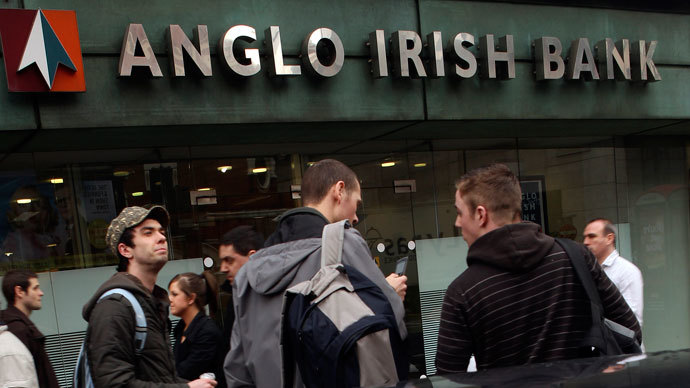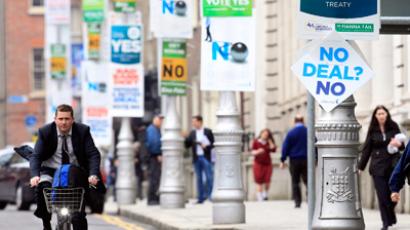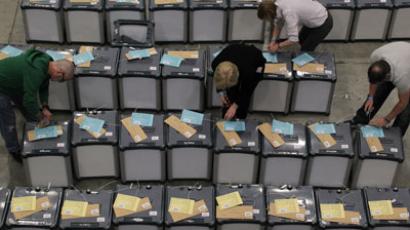'Get them to write a big check:' Irish banker pulls bailout figure from 'arse' in leaked tapes

Executives at the Anglo Irish Bank were recorded joking about how they lied to Dublin about the bank’s financial future in 2008, convincing lawmakers to invest in the failing bank with figures “picked out of my arse” - with no plans to pay them back.
John Bowe, the head of capital markets for Anglo Irish, was recorded laughing as he explained to Peter Fitzgerald, the former head of banking, how Anglo Irish had fleeced the Irish government into providing billions of euro to keep the bank solvent.
The 2008 conversation was captured by the bank’s internal recording system and published by the Irish Independent. Ireland still has yet to fully recover from the financial crisis, despite attempts to bring the country back to normalcy by way of a drastic austerity program set in motion in the four years since.
In the September 2008 conversation caught on the tape, Bowe
admits he knew the €7 billion he initially asked for would not be
enough to spare the bank, which was within mere days of a
complete meltdown. When asked about the origin of that figure,
Bowe referred to then-Anglo Irish CEO David Drumm.
“Just as Drummer would say, ‘picked it out of my arse,’ you know,” he said. “I mean, look, what we did was we basically said: ‘What is the amount we can securitize over the next six months? And basically say to them: ‘Look our problem here is time, it’s not our ability to create the liquidity, the enemy is time here.’”
Both Bowe and Fitzgerald can be heard laughing through the discussion. The tapes’ release also confirms the long-held suspicion that Irish bankers knew the initial government investments were far too small.
“Yeah and that number is seven, but the reality is that actually we need more than that,” Bowe said. “But you know, the strategy here is you pull them in, you get them to write a big check and they have to keep – they have to support their money.”
Anglo Irish has since been renamed the Irish Bank Resolution Corporation, and is still in the process of being liquidated, as the austerity-hit country awaits a high-profile court case into the collapse of the bank.
Recent estimates indicate that, all told, Irish taxpayers will have supplied Anglo Irish Bank alone with €30 billion - a massive sum for the small island nation of just over 4.5 million people.
“If they (the Central Bank) saw the enormity of it up front, they might decide they have a choice. You know what I mean? They might say the cost to the taxpayer is too high,” Bowe went on. “If it doesn’t look too big at the outset – if it looks big enough to be important, but not too big that it kind of spoils everything, then, I think you have a chance.”
“So, so it’s bridged until we can pay you back. Which is never.”
Fitzgerald is heard saying, “Yeah. They’ve got skin in the
game and that is the key.”
In statements to national broadcaster RTE, the two executives denied any wrongdoing and any “strategy or intention on the part of Anglo Irish Bank to mislead the authorities.” The two men did not deny the conversation in the excerpts of the statements that RTE read out, Reuters reports.
Bowe excused his comments as “off-the-cuff” when
questioned by reporters over the weekend.
Irish opposition parties called for a new probe into the banking
crisis, calling the conversation “shocking to the
core.”
Government officials have previously blamed an inability to establish a parliamentary committee as the reason for Dublin's failure to hold a public inquiry.
“Any suggestion that the taxpayer was lured into bailing out
Anglo Irish Bank under a false impression about the state of the
bank’s financial condition is deeply disturbing and has to be
fully investigated by the authorities,” said Michael McGrath,
finance spokesman of Fianna Fail (The Republican Party).
Ireland has yet to criminally prosecute a single banker who helped gamble the country into an economic tailspin. Pearse Doherty, a finance spokesman for the Irish party Sinn Fein, told the Financial Times the new revelations are a perfect opportunity to reverse that trend.
“They prove conclusively that an investigation is needed into the events surrounding the bank guarantee and subsequently that the people must be prosecuted for their roles in collapsing the Irish economy,” he said.














